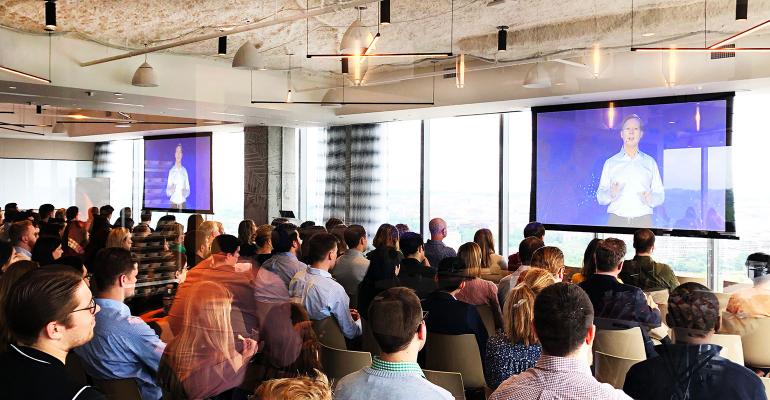Brought to you by:

The coronavirus stopped meetings and events in their tracks. It’s an unprecedented time for the industry—but it will undoubtedly recover.
“I am very strongly convinced that the physical event business will bounce back,” said David Meerman Scott, best-selling author and frequent public speaker who studies how neuroscience affects behavior. “Humans crave physical interaction with other humans. We want to be part of a tribe of other humans. That’s baked into our neuroscience. Our brains thrive around being around people who are just like us.”
Getting back to normal will take some time, and events will look very different in the interim. Expect more sophisticated virtual participation options, smaller satellite events complementing larger gatherings, and people carefully examining the return on investment from attending.
Ready to explore the new normal?
Enhanced Virtual Participation
The coronavirus forced many companies to explore work-from-home options, relying heavily on Wi-Fi, streaming, and video conferencing. So far, the tech came through with flying colors. There’s no doubt that business travel and meetings will look very different when we come through the other side of this crisis. Smart event organizers also realize that budgets are tightening so they’d better offer compelling virtual participation options.
“More organizations will realize they can offer a hybrid— a live event plus the option to participate virtually,” said Scott. “I think a lot of events will go to a dual model.”
Ben Nemtin, a best-selling author who speaks at around 100 events per year, also foresees hybrids of live and virtual events. But don’t simply expect a tersly thrown together livestream from a webcam in the corner.
Nemtin stresses the importance of high production value in order to keep attendees engaged. “In the same way organizers have a production team for the live meeting, they’ll probably have a production team solely focused on the virtual experience.”
Hybrid events will help the industry steadily gain traction as the world waits for a COVID-19 vaccine or other indications that it’s truly safe to meet in large groups.
“Even if the travel ban is lifted, meetings are allowed to take place, we limit physical contact, and we have the virus under control—there’s still going to be a ton of fear,” said Nemtin. “A lot of people won’t feel comfortable coming to events because of the risk, even though it might be small.”
Despite the fear, Nemtin agrees that the events business will come roaring back.
“The importance of human interaction has now more than ever been illustrated to us. Yes, we can survive without human interaction but it’s difficult. Even if you just see someone for 10 minutes and go for a walk with them and stay 10 feet apart, that recharges your battery. You get that same recharge when you see your colleagues and interact face-to-face. You just can’t get that in a Zoom meeting.”
Satellite Events: Face-to Face Interaction With Less Danger
Events industry leader David Adler says to expect smaller satellite events complementing larger gatherings. So if the main event is in Atlanta, you might have smaller hubs in Philadelphia, Dallas, and Seattle.
“It’s going to be a hub-and-spoke model,” he said.
That will be especially true in the early going, when people might be wary of larger gatherings but more willing to attend smaller ones.
The most important aspect of a physical meeting will be value. With budgets tight and attendees still wary of the danger of the virus, meetings and events must add serious value to attract people.
“Face-to-face meetings will look very different on the other side of this crisis, but I think this time of social distancing is showing us more than ever how important physically convening really is,” says Convene’s Global Chief Operating and Chief People Officer, Amy Pooser. “The challenge is finding a balance that serves our fundamental human need for connection while also accommodating our new reality as a society.”
For more helpful articles like this, please visit Catalyst, Convene’s meeting, event, and workplace blog. Like what you read? Subscribe by email for new stories every week.





